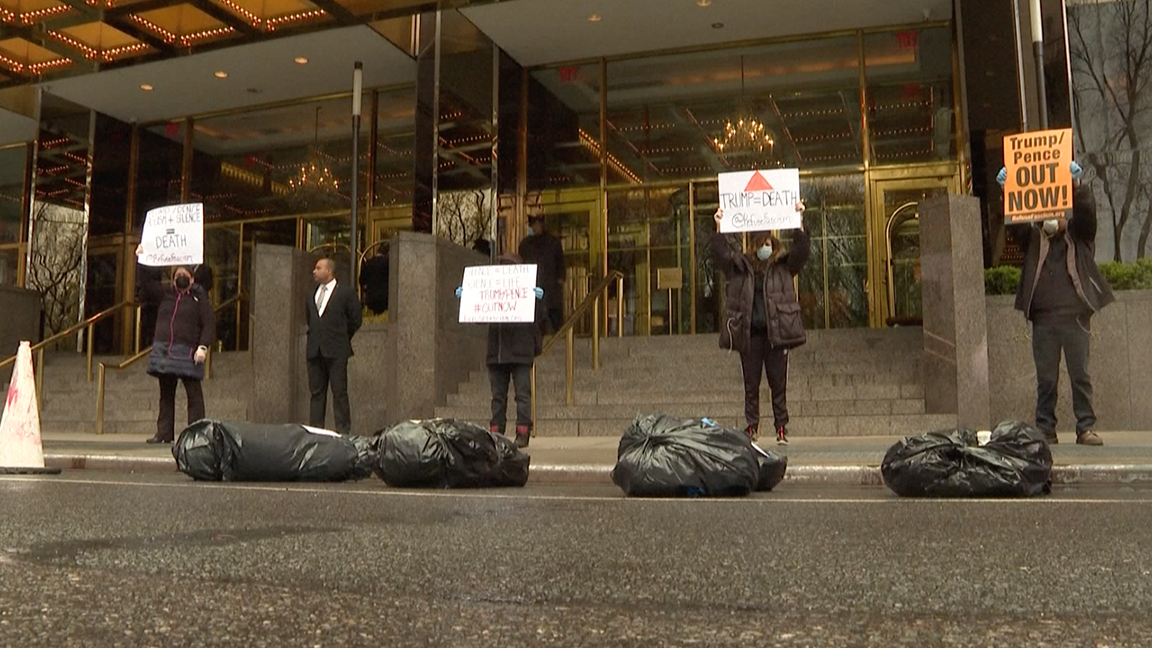Editor's note: This is the 42nd article in the COVID-19 Global Roundup series. Here is the previous one.
The spread of COVID-19 does not seem to have eclipsed political, social, and economic issues. In scattered locations around the world, people are still taking to the streets to voice their opposition to wide-ranging issues not necessarily related to coronavirus measures.
On Sunday, thousands of Israelis demonstrated against Prime Minister Benjamin Netanyahu in Tel Aviv's Rabin Square. Strictly observing social distancing rules, they mostly wore face masks and kept six feet apart while waving black flags.
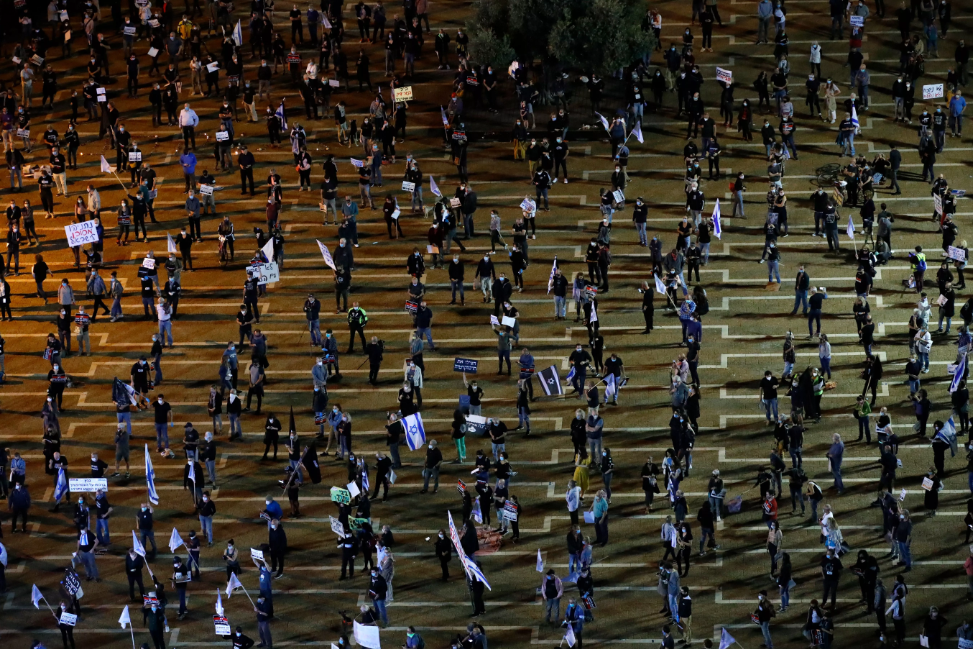
Protesters keep their distance in Tel Aviv, Israel, April 19, 2020. /AFP
Protesters keep their distance in Tel Aviv, Israel, April 19, 2020. /AFP
Netanyahu is under criminal indictment in three corruption cases, although he denies any wrongdoing. He is also negotiating a power-sharing deal with his rival Benny Gantz to form a coalition government that would end a year of political deadlock after three inconclusive elections.
Demonstrations are allowed under Israel's coronavirus restrictions, as long as participants maintain distance from each other and wear face masks.
Under the banner of "Save the Democracy," protesters called on Gantz's Blue and White party not to take part in a coalition led by a premier charged with corruption. Gantz has campaigned for a clean government, but said that the coronavirus crisis has forced him to go back on his election pledge.
Related reading: Thousands of anti-Netanyahu Israelis demonstrate to 'save democracy'
Elsewhere in the world, protests spurred by the devastating suspension of economic activities have erupted. Lacking a stream of income and with unanswered questions over when to resume work, many people felt compelled to urge their governments to restore economic normalcy.
Last week, India's decision to extend a lockdown on its 1.3 billion people until at least May 3 saw an immediate push-back from migrant workers in Mumbai.
Sharp downward revisions to economic growth forecasts in the wake of the pandemic point towards surging unemployment, but Prime Minister Narendra Modi urged Indians to maintain the discipline shown in the first three weeks of the lockdown.
02:46
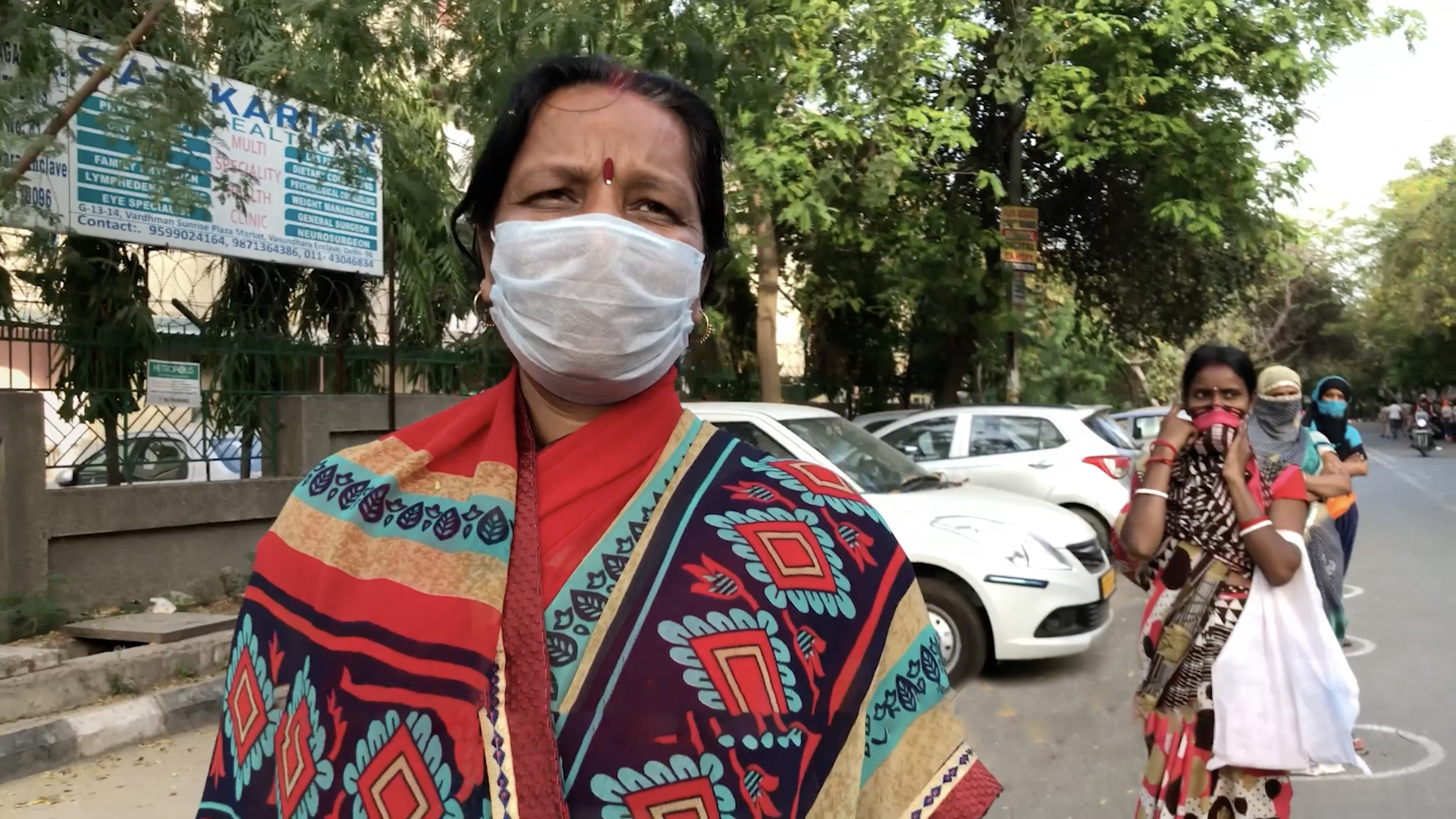
"That means until May 3, each and every one of us will have to remain in the lockdown," Modi said in a televised address. "From an economic only point of view, it undoubtedly looks costly right now; but measured against the lives of Indian citizens, there is no comparison itself."
A few hours after Modi's address, thousands of jobless migrant workers gathered at a railway station in Mumbai, demanding they be allowed to travel to their homes in the countryside.
"Since trains and buses are not operational, they were making noise. To disperse them, police were forced to lathi (baton) charge," said a senior police official.
Hundreds of thousands fled big cities for their homes in the hinterland when Modi announced the lockdown last month, many walking great distances with their families on empty highways. Yet for the tens of thousands of those stranded in the capital, the only option for them was to resume their work routine.
"It is my request and prayer to all fellow citizens, that we must not let coronavirus spread to new areas at any cost," Modi said. But the shutdown of the 2.9-trillion-U.S.-dollar economy is exacting a heavy toll. Since the lockdown began in late March, unemployment has almost doubled to around 14.5 percent, according to the Centre for Monitoring Indian Economy, a Mumbai-based private think tank.
The shutdown has already sparked an exodus of millions of workers from small industries like textiles and leather, and service industries like retail, tourism, construction and other sectors from cities to the villages.
"I am well aware of the problems you have faced – some for food, some for movement from place to place, and others for staying away from homes and families," Modi said. For them, he offered the hope that restrictions in parts of the country that are not coronavirus hot spots might be slightly eased next week.
Former Finance Minister P. Chidambaram said that while the country stood behind Modi in fighting the pandemic, he could do more for the poor. "There is money, there is food, but the government will not release either money or food," he said.
Sweeping stay-at-home orders in 42 U.S. states to combat the coronavirus have shuttered businesses, disrupted lives and decimated the economy. Angry protesters have gathered in the streets to urge governors to rethink the restrictions.
02:01
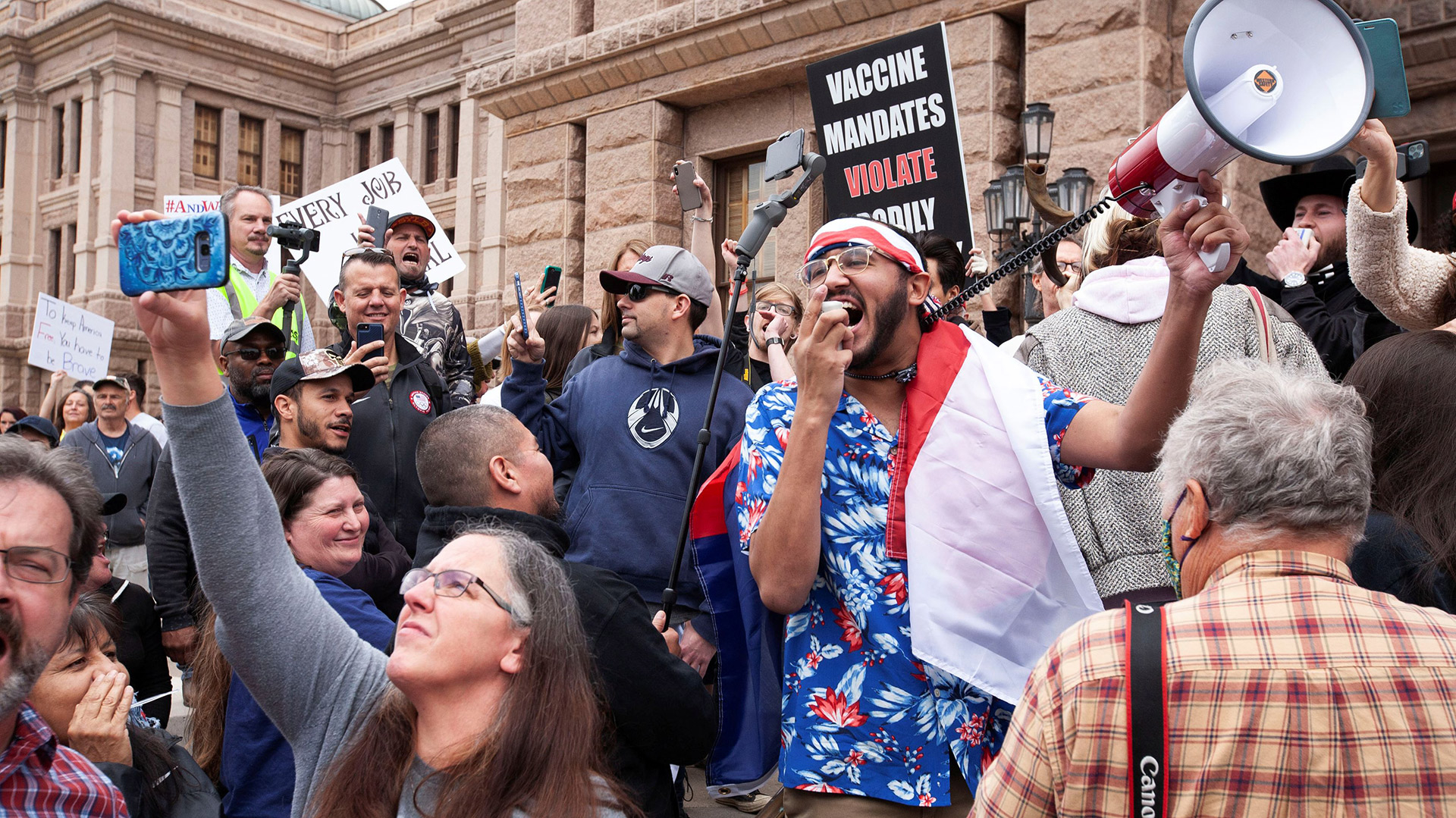
A few dozen protesters, many with young children, gathered in Virginia's state capital of Richmond on Thursday in defiance of Democratic Governor Ralph Northam's mandate, the latest in a series of demonstrations this week around the country.
The protests have taken on a partisan tone, often featuring supporters of President Donald Trump, and criticizing governors whose shelter-at-home directives are intended to slow the spread of a pandemic that has killed more than 41,000 across the United States.
On Wednesday, thousands of Michigan residents blocked traffic in Lansing, the state capital, while protesters in Kentucky disrupted Democratic Governor Andy Beshear's afternoon news briefing on the pandemic, chanting "We want to work!"
States including Utah, North Carolina and Ohio also saw demonstrations this week, and more are planned for the coming days, including in Oregon, Idaho and Texas.
Meanwhile, in other parts of the world where economic prospects also appear dim, unrest has entered the public space as people call for work resumption.
As a fragile economy already displaying signs of collapsing long before the arrival of the pandemic, Lebanon has witnessed throngs of angry people flocking to the streets in the capital Beirut and the northern city of Tripoli on at least three occasions.
In Brasilia, Brazil, demonstrations were held on Sunday to protest coronavirus-related lockdowns and to call for a military intervention on behalf of President Jair Bolsonaro. More than 35,000 Brazilians have tested positive for the coronavirus and about 2,300 deaths have been recorded in the country. The president joined the protests, which view the country's supreme court and legislature as obstacles to his anti-lockdown campaign.
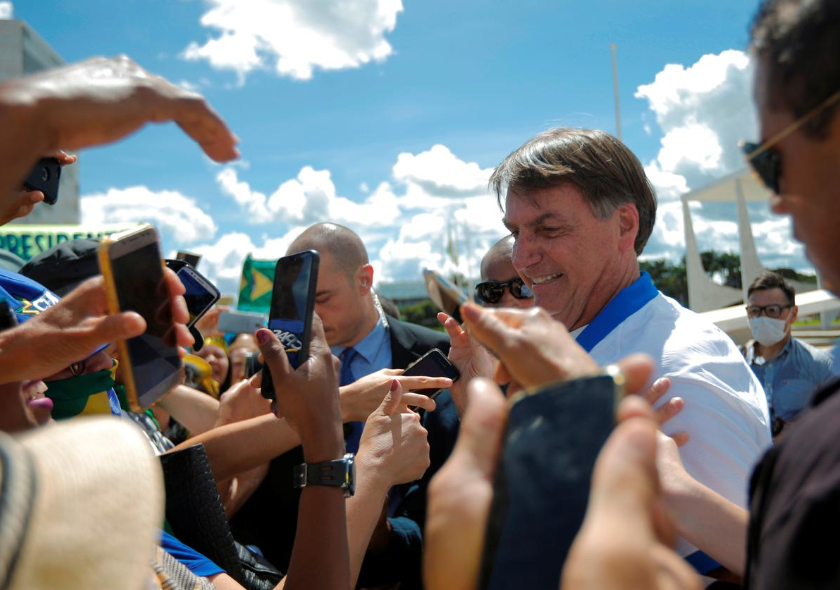
Brazil's President Jair Bolsonaro meets supporters during a protest against Brazil's Congress and Brazilian Supreme Court amid the coronavirus outbreak, in Brasilia, Brazil, March 15, 2020. /Reuters
Brazil's President Jair Bolsonaro meets supporters during a protest against Brazil's Congress and Brazilian Supreme Court amid the coronavirus outbreak, in Brasilia, Brazil, March 15, 2020. /Reuters
Opposition to government's lockdown measures is not only driven by economic meltdown, but some protests have to do with the resulting curbs on personal freedom, which some believe are a breach to democracy.
After authorities in the city of Giessen, Germany, banned a protest planned for last week, young activists took the case to court in a bid to denounce rules that bar public gatherings of more than two people.
They petitioned the country's Constitutional Court after two lower courts sided with local authorities and maintained the ban on demonstrations even though organizers had promised to respect distancing rules during the march.
Pro-democracy activists in Giessen, in the state of Hesse, say the lockdown measures breach freedom of assembly, a key tenet of the German constitution.
On Thursday, the Constitutional Court ruled that Germans have the right to hold political protests if they adhere to social distancing rules in place to slow the spread of the coronavirus.
But in a blow to authorities eager to keep strict social distancing measures in place, the Constitutional Court said a general ban on demonstrations would be unconstitutional and ordered them to review their decision. It stopped short of allowing the demonstration to go ahead.
Even before Thursday's verdict, leftist groups had vowed to hold their annual Labor Day demonstrations and street parties on May 1 in cities such as Berlin and Hamburg despite the events being cancelled by authorities due to the coronavirus.
"We decide whether the May 1 festival takes place in Berlin, not the police, not the city government and the federal government," one leftist group was cited as saying by Berlin city officials.
The social distancing rules have also come under fire from the far-right Alternative for Germany, which urged the government to reverse a decision in keeping churches closed during Easter.
Criticism at governments' late response to the spread of coronavirus was also seen from Britain to the U.S. Demonstrations have taken a variety of forms as peopled avoided breaking social distancing rules while explicitly articulating the key cause for their dissatisfaction.
Most have taken their discontent to social media, while some have come up with creative ways to vent their anger.
On Saturday, protesters placed fake body bags in front of the Trump International Hotel in New York City, presumably to remind the U.S. administration of the deadly consequences of the late coronavirus response.
(With input from agencies)
01:25
